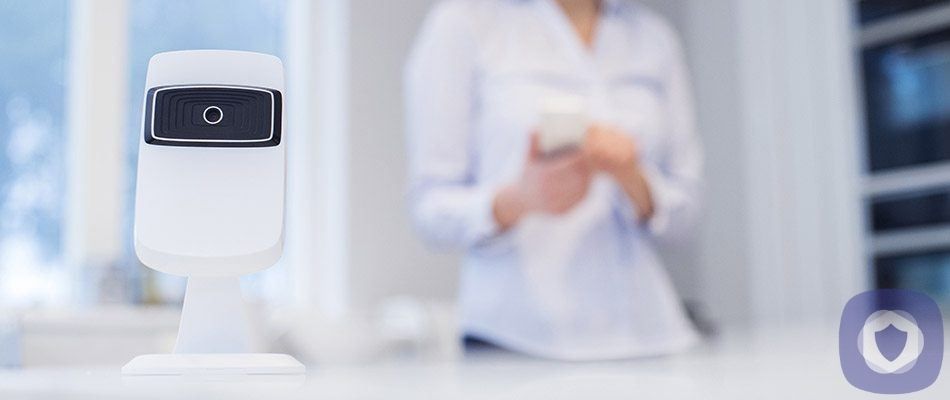There are more home security options than ever available on the market, but the sheer number of products and services to choose from can leave homeowners feeling puzzled as to which is the best option. If you’re considering using a security system, the first choice you need to make is whether that system will be wired or wireless. Both offer ample protection to secure your home from burglars, but there are some major differences that you need to understand before you decide which type is the best home security system for your family.
Wired Security Systems
A wired security system is one that’s integrated directly into your home’s electrical system, usually via a landline, just like your home’s phone and internet connections. Ideally, wired security systems are installed while a home is being built, though they can be installed after the fact for additional costs. People like wired security systems for the convenience. Because they’re a part of the home’s power system, they don’t require batteries or charging, and they’re usually simple to set up. Additionally, there are no signal or data limits to wired sensors and devices. The system should also be compatible with any monitoring service, so if you decide to switch to a new security provider, you won’t need to worry about purchasing all new equipment. At most, a control panel may need to be swapped out or a converter installed into the existing system.
Of course, the obvious downside to a wired security system is that the initial install can be pricey. If the system was not installed during the homebuilding process, setting one up may require drilling holes into walls, running new wires, patching drywall and gaining access to difficult spots that are sealed off in basements or attics. Wired security systems are also vulnerable to power outages. Most will have a backup battery system that switches on in the event of an outage, but long term outages will result in the system losing power. It’s also important to consider how long you plan to stay at the same residence when choosing a wired system. Because these security systems are integrated into the home’s wiring, they are not portable and can’t move with you.
Wireless Security Systems
If your home is not pre-wired for a wired security system, the best option may be to go wireless. Wireless security systems are a network of sensors, motion detectors and surveillance cameras that can be installed without professional assistance and are entirely mobile. Since they rely on battery power, wireless systems will still work during a power outage. Most wireless systems also work with your mobile device, giving you the ability to monitor the system when you’re not at home, as well as do things like adjust the thermostat or close the garage door from afar. And while professional installation is not required, there are companies that offer wireless security with full installation if it’s not something you want to take on yourself.
The downside to a wireless system is that it relies on a wireless signal, meaning that storms and strong winds have the power to disrupt the system and could even trigger false alarms. False alarms are known to be more common with wireless security systems than with wired ones and they could result in fines from the provider or the police if they happen frequently enough. Another potential downside to wireless security is that the batteries on each piece of equipment must be replaced or charged regularly in order to keep the system working. Wireless equipment can also be more expensive than the equipment for a wired security system, though that is typically offset by the fact that there are no installation costs.
Hybrid Systems
If you have a wired security system, you can still reap some of the benefits of wireless security products. A hybrid alarm system allows you to take advantage of your home’s pre-wired security system and add on any wireless equipment needed. Most wired systems are compatible with wireless parts, such as door sensors and security cameras, so it’s simple to add select components to bolster your security system as needed.
The best part about having a hybrid system is that it’s highly customizable, so you can build the ideal security system for your unique living situation. It is important, though, to verify that your wired security system can support the newest wireless technology. Over time, wired systems may need updating in order to continue to perform in tandem with advancements in wireless security.
With the advancements that have already been made in both wired and wireless security systems, there’s really no “wrong” option to choose. No matter which system you have, your home will be protected in a way that is streamlined and convenient. For most families, the question will come down to how much they’d like to spend on security, the ease of installation, and the process of using the security system itself.
Wired systems offer permanence and greater reliability, while wireless systems offer a high level of customization and the ease of mobility. While the equipment for wired security systems is typically cheaper, installation costs can take a bigger toll on your wallet than wireless security would. Regardless of which option you choose, you can rest assured that both types of security systems are making your home a safer place for your family and providing you with greater peace of mind.
This article has been reviewed and approved by Officer Banta.

Officer Banta is the official SecurityNerd home security and safety expert. A member of the Biloxi Police Department for over 24 years, Officer Banta reviews all articles before lending his stamp of approval. Click here for more information on Officer Banta and the rest of our team.

